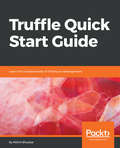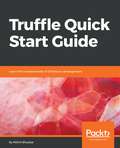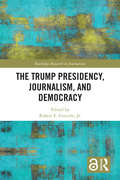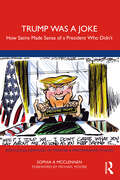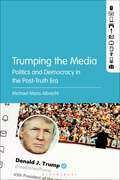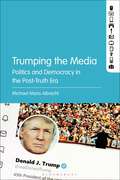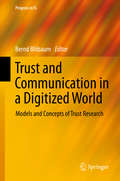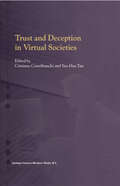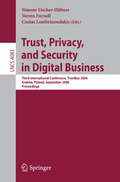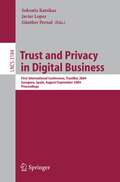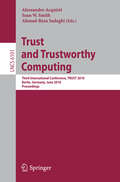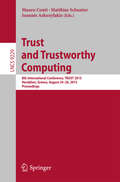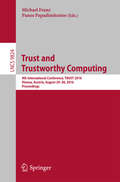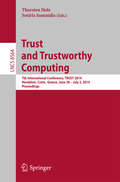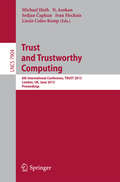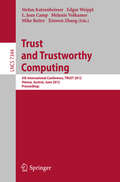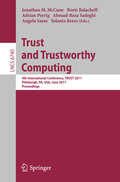- Table View
- List View
Tru64 UNIX Troubleshooting: Diagnosing and Correcting System Problems (HP Technologies)
by Martin Moore Steven HancockDealing with system problems—from user login failures to server crashes--is a critical part of a system administrator's job. A down system can cost a business thousands of dollars per minute. But there is little or no information available on how to troubleshoot and correct system problems; in most cases, these skills are learned in an ad-hoc manner, usually in the pressure-cooker environment of a crisis. This is the first book to address this lack of information.The authors (both experienced Tru64 UNIX support engineer for Compaq) systematically present the techniques and tools needed to find and fix system problems. The first part of the book presents the general principles and techniques needed in system troubleshooting. These principles and techniques are useful not only for UNIX system administrators, but for anyone who needs to find and fix system problems. After this foundation, the authors describe troubleshooting tools used in the UNIX environment. The remainder of the book covers specific areas of the Tru64 UNIX operating system in detail: listing common problems, their causes, how to detect them, and how to correct them. Each chapter includes a "Before You Call Support" section that details the most important things to check and correct before it's necessary to call Compaq technical support. The authors also include decision trees to help the reader systematically isolate particular problem types.· "Before You Call Tech Support" sections· Tables and diagrams for quick access to precise data· Decision trees to help choose the best way to troubleshoot a particular problem
TruCluster Server Handbook (HP Technologies)
by Scott Fafrak Jim Lola Dennis O'Brien Gregory Yates Brad NicholsThe TruCluster Server Handbook authoritatively details how to plan, design, install, configure, and administer a cluster of Tru64 UNIX systems. The book explains how to configure and optimize hardware underlying a TruCluster server, including storage servers so critical to running a high-end cluster operation. This book provides best practices and techniques drawn from the authors' extensive experiences in the field with systems designers, systems managers, developers, and users. The authors include a former Tru64 UNIX Technical Group Leader with HP's Consulting Division and a top industry figure, and two former TruCluster Server Team Leaders with the Customer Support Center.Learn to install TruCluster Server from the ground upGet the most out of your cluster environment with the authors' practical tips and tricksAttain availability, scalability, and simplified manageability in your IT systems operation
Truffle Quick Start Guide: Learn the fundamentals of Ethereum development
by Nikhil BhaskarDevelop, test, and deploy decentralized applications for Ethereum platform Key Features Build your first Ethereum Dapp with Truffle: the most popular Ethereum development framework Build, compile, and deploy smart contracts in your development environment Embrace Blockchains and utilize it to create new generation of secured and scalable apps Book Description Truffle is a world-class development environment, testing framework and asset pipeline for Ethereum, aiming to make life as an Ethereum developer easier. If you are a web developer wanting to try your hand at developing Dapps with Truffle, then this is the book for you. This book will teach you to write smart contracts and build Dapps with Truffle. You will begin with covering the basics of Truffle, briefly explaining how it integrates Solidity and Web3, in orderto start building a mini decentralized application. Also, you will dive into migration, testing and integrating Truffle with the use of popular JavaScript frameworks. Lastly, you will ship your decentralized application and package it into a product. Moreover, you will go through the best practices in Truffle,so as to increase your proficiency in building Dapps with Truffle. By the end of the book, you will be able to write smart contracts and build decentralized applications with Truffle on Ethereum blockchains. What you will learn Understand the fundamentals of Truffle and Web3 Build a decentralized application with Truffle, while choosing the correct Ethereum client Connect your Dapp to Ethereum clients including Geth, Parity, and Ganache Migrate and test your Dapp with the correct networks such as Ropsten and Rinkeby Package a decentralized application into a user-friendly product by integrating Truffle with JavaScript frameworks such as Angular, React and Vue Explore tools including Ethereum Package Manager, the Registrar and browser wallets, and exploit third-party smart contract libraries. Evaluate the common migration pitfalls and how to mitigate them Who this book is for This book is for web developers who are interested in the new world blockchain. Some basic understanding of JavaScript and web services is required. No prior knowledge of Decentralized applications or blockchain is required.
Truffle Quick Start Guide: Learn the fundamentals of Ethereum development
by Nikhil BhaskarDevelop, test, and deploy decentralized applications for Ethereum platform Key Features Build your first Ethereum Dapp with Truffle: the most popular Ethereum development framework Build, compile, and deploy smart contracts in your development environment Embrace Blockchains and utilize it to create new generation of secured and scalable apps Book Description Truffle is a world-class development environment, testing framework and asset pipeline for Ethereum, aiming to make life as an Ethereum developer easier. If you are a web developer wanting to try your hand at developing Dapps with Truffle, then this is the book for you. This book will teach you to write smart contracts and build Dapps with Truffle. You will begin with covering the basics of Truffle, briefly explaining how it integrates Solidity and Web3, in orderto start building a mini decentralized application. Also, you will dive into migration, testing and integrating Truffle with the use of popular JavaScript frameworks. Lastly, you will ship your decentralized application and package it into a product. Moreover, you will go through the best practices in Truffle,so as to increase your proficiency in building Dapps with Truffle. By the end of the book, you will be able to write smart contracts and build decentralized applications with Truffle on Ethereum blockchains. What you will learn Understand the fundamentals of Truffle and Web3 Build a decentralized application with Truffle, while choosing the correct Ethereum client Connect your Dapp to Ethereum clients including Geth, Parity, and Ganache Migrate and test your Dapp with the correct networks such as Ropsten and Rinkeby Package a decentralized application into a user-friendly product by integrating Truffle with JavaScript frameworks such as Angular, React and Vue Explore tools including Ethereum Package Manager, the Registrar and browser wallets, and exploit third-party smart contract libraries. Evaluate the common migration pitfalls and how to mitigate them Who this book is for This book is for web developers who are interested in the new world blockchain. Some basic understanding of JavaScript and web services is required. No prior knowledge of Decentralized applications or blockchain is required.
Truffle Quick Start Guide: Learn The Fundamentals Of Ethereum Development
by Nikhil BhaskarTruffle is a world class development environment, testing framework and asset pipeline for Ethereum, aiming to make life as an Ethereum developer easier. If you are a web developer wanting to try your hands at developing Dapps with Truffle then this is the ideal book. This book will teach you to write smart contracts and build Dapps with Truffle.
The Trump Presidency, Journalism, and Democracy (Routledge Research in Journalism)
by Robert E. Gutsche Jr.This book examines the disruptive nature of Trump news – both the news his administration makes and the coverage of it – related to dominant paradigms and ideologies of U.S. journalism. By relying on conceptualizations of media memory and "othering" through news coverage that enhances socio-conservative positions on issues such as immigration, the book positions this moment in a time of contestation. Contributors ranging from scholars, professionals, and media critics operate in unison to analyze today’s interconnected challenges to traditional practices within media spheres posed by Trump news. The outcomes should resonate with citizens who rely on journalism for civic engagement and who are active in social change
The Trump Presidency, Journalism, and Democracy (Routledge Research in Journalism)
by Robert E. Gutsche Jr.This book examines the disruptive nature of Trump news – both the news his administration makes and the coverage of it – related to dominant paradigms and ideologies of U.S. journalism. By relying on conceptualizations of media memory and "othering" through news coverage that enhances socio-conservative positions on issues such as immigration, the book positions this moment in a time of contestation. Contributors ranging from scholars, professionals, and media critics operate in unison to analyze today’s interconnected challenges to traditional practices within media spheres posed by Trump news. The outcomes should resonate with citizens who rely on journalism for civic engagement and who are active in social change
Trump Was a Joke: How Satire Made Sense of a President Who Didn’t (Routledge Advances in Theatre & Performance Studies)
by Sophia A McclennenWritten by a scholar of satire and politics, Trump Was a Joke explains why satire is an exceptional foil for absurd political times and why it did a particularly good job of making sense of Trump. Covering a range of comedic interventions, Trump Was a Joke analyzes why political satire is surprisingly effective at keeping us sane when politics is making us crazy. Its goal is to highlight the unique power of political satire to encourage critical thinking, foster civic action, and further rational debate in moments of political hubris and hysteria. The book has been endorsed by Bassem Youssef, who has been referred to as the “Jon Stewart of Egypt,” and Srdja Popovic, author of Blueprint for Revolution, who used satirical activism to bring down Serbian dictator Slobodan Milosevic. With a foreword by award-winning filmmaker, satirist, and activist Michael Moore, this study will be of interest to readers who follow politics and enjoy political comedy and will appeal to the communications, comedy studies, media studies, political science, rhetoric, cultural studies, and American studies markets.
Trump Was a Joke: How Satire Made Sense of a President Who Didn’t (Routledge Advances in Theatre & Performance Studies)
by Sophia A McclennenWritten by a scholar of satire and politics, Trump Was a Joke explains why satire is an exceptional foil for absurd political times and why it did a particularly good job of making sense of Trump. Covering a range of comedic interventions, Trump Was a Joke analyzes why political satire is surprisingly effective at keeping us sane when politics is making us crazy. Its goal is to highlight the unique power of political satire to encourage critical thinking, foster civic action, and further rational debate in moments of political hubris and hysteria. The book has been endorsed by Bassem Youssef, who has been referred to as the “Jon Stewart of Egypt,” and Srdja Popovic, author of Blueprint for Revolution, who used satirical activism to bring down Serbian dictator Slobodan Milosevic. With a foreword by award-winning filmmaker, satirist, and activist Michael Moore, this study will be of interest to readers who follow politics and enjoy political comedy and will appeal to the communications, comedy studies, media studies, political science, rhetoric, cultural studies, and American studies markets.
Trumping the Media: Politics and Democracy in the Post-Truth Era
by Michael Mario AlbrechtThe ascendency of Donald J. Trump to the office of president was not a fluke. Changes in the media environment and changes in the political landscape converged and provided fertile ground for a demagogic populist to exploit existing structures for his personal and political gains. A right-wing ecosystem had developed that included cable television, talk radio, social media, and imageboards. The political rise of Trump occurred alongside a mainstreaming of far-right politics and a skepticism towards long-established institutions. Trump was able to exploit the shifts in politics and the media environment for his political gain. He deployed a post-truth strategy that challenged established media and political institutions and their claims to be arbiters of truth and protectors of democracy. This book explores the shifts in the media environment that made the political career of Donald Trump possible. The author shows the ways that Trump was able to inhabit the new media and political landscape and take advantage of journalistic norms and practices that were susceptible to exploitation by a demagogue with no allegiance to the truth and no reverence towards the foundations of liberal democracy. Understanding the ways in which Trump was able to emerge as a powerful political force is essential to those invested in challenging the momentum of the alt-right and forwarding the project of democracy.
Trumping the Media: Politics and Democracy in the Post-Truth Era
by Michael Mario AlbrechtThe ascendency of Donald J. Trump to the office of president was not a fluke. Changes in the media environment and changes in the political landscape converged and provided fertile ground for a demagogic populist to exploit existing structures for his personal and political gains. A right-wing ecosystem had developed that included cable television, talk radio, social media, and imageboards. The political rise of Trump occurred alongside a mainstreaming of far-right politics and a skepticism towards long-established institutions. Trump was able to exploit the shifts in politics and the media environment for his political gain. He deployed a post-truth strategy that challenged established media and political institutions and their claims to be arbiters of truth and protectors of democracy. This book explores the shifts in the media environment that made the political career of Donald Trump possible. The author shows the ways that Trump was able to inhabit the new media and political landscape and take advantage of journalistic norms and practices that were susceptible to exploitation by a demagogue with no allegiance to the truth and no reverence towards the foundations of liberal democracy. Understanding the ways in which Trump was able to emerge as a powerful political force is essential to those invested in challenging the momentum of the alt-right and forwarding the project of democracy.
Trust and Communication in a Digitized World: Models and Concepts of Trust Research (Progress in IS #0)
by Bernd BlöbaumThis book explores models and concepts of trust in a digitized world. Trust is a core concept that comes into play in multiple social and economic relations of our modern life. The book provides insights into the current state of research while presenting the viewpoints of a variety of disciplines such as communication studies, information systems, educational and organizational psychology, sports psychology and economics. Focusing on an investigation of how the Internet is changing the relationship between trust and communication, and the impact this change has on trust research, this volume facilitates a greater understanding of these topics, thus enabling their employment in social relations.
Trust and Deception in Virtual Societies
by Cristiano Castelfranchi Yao-Hua Yao-Hua TanOne of the major problems in the development of virtual societies, in particular in electronic commerce and computer-mediated interactions in organizations, is trust and deception. This book provides analyses by various researchers of the different types of trust that are needed for various tasks, such as facilitating on-line collaboration, building virtual communities and network organizations, and even the design of effective and user-friendly human-computer interfaces. The book has a multi-disciplinary character providing theoretical models of trust and deception, empirical studies, and practical solutions for creating trust in electronic commerce and multi-agent systems.
Trust and Fairness in Open, Distributed Systems (Studies in Computational Intelligence #298)
by Adam WierzbickiThis book is an attempt to bring closer the greater vision of the development of Social Informatics. Social Informatics can be de?ned as a discipline of informatics that studies how information systems can realize social goals, use social concepts, or become sources of information about social phenomena. All of these research directions are present in this book: fairness is a social goal; trust is a social concept; and much of this book bases on the study of traces of Internet auctions (used also to drive social simulations) that are a rich source of information about social phenomena. The book has been written for an audience of graduate students working in the area of informatics and the social sciences, in an attempt to bridge the gap between the two disciplines. Because of this, the book avoids the use of excessive mathematical formalism, especially in Chapter 2 that attempts to summarize the theoretical basis of the two disciplines of trust and fa- ness management. Readers are usually directed to quoted literature for the purpose of studying mathematical proofs of the cited theorems.
Trust And Loyalty In Electronic Commerce: An Agency Theory Perspective (Non-ser.)
by Zeinab Karake-ShalhoubKarake-Shalhoub uses agency theory to ground her empirical analysis of more than 100 e-commerce firms in this highly readable examination of trust in e-commerce relational exchanges. She identifies several trust-building measures, including privacy statements, the existence of a chief privacy officer, and a trusted third-party seal of approval; companies are then evaluated based on an index of those trust builders. She demonstrates that there is a positive relationship between management ownership and trust, and that managers who fail to protect the interests of their stockholders-as well as their own-will never gain customer loyalty. Any business considering a move into e-commerce, or re-evaluating an earlier investment in online marketing and retailing, will benefit greatly from Karake-Shalhoub's insights. The timeliness of this studythe first of its kindand its unique agency-theory perspective allow for an analysis of the appropriateness of e-business and e-commerce for certain businesses. What are e-commerce businesses that are developing loyalty and building trust doing differently than their less successful competitors? How are successful companies moving from traditional applications to the new breed of integrated e-commerce architectures? Karake-Shalhoub answers these and other pressing questions for senior and mid-level managers and strategic planners, corporate executives charged with incorporating an e-commerce strategy into their long-range plans, chief privacy officers, regulatory policymakers, and students of e-commerce, customer relationship management, and online marketing.
Trust and Privacy in Digital Business: Third International Conference, TrustBus 2006, Krakow, Poland, September 4-8, 2006, Proceedings (Lecture Notes in Computer Science #4083)
by Simone Fischer-Hübner Steven Furnell Costas LambrinoudakisThis book constitutes the refereed proceedings of the Third International Conference on Trust and Privacy in Digital Business, TrustBus 2006, held in conjunction with DEXA 2006. The book presents 24 carefully reviewed, revised full papers, organized in topical sections on privacy and identity management, security and risk management, security requirements and development, privacy enhancing technologies and privacy management, access control models, trust and reputation, security protocols and more.
Trust and Privacy in Digital Business: First International Conference, TrustBus 2004, Zaragoza, Spain, August 30-September 1, 2004, Proceedings (Lecture Notes in Computer Science #3184)
by Sokratis Katsikas Günther PernulSincerely welcome to proceedings of the 1st International Conference on Trust and Privacy in Digital Business, Zaragoza, Spain, held from August 30th to September 1st, 2004. This conference was an outgrowth of the two successful TrustBus inter- tional workshops, held in 2002 and 2003 in conjunction with the DEXA conferences in Aix-en-Provence and in Prague. Being the first of a planned series of successful conferences it was our goal that this event would initiate a forum to bring together researchers from academia and commercial developers from industry to discuss the state of the art of technology for establishing trust and privacy in digital business. We thank you all the attendees for coming to Zaragoza to participate and debate the new emerging advances in this area. The conference program consisted of one invited talk and nine regular technical papers sessions. The invited talk and keynote speech was delivered by Ahmed Patel from the Computer Networks and Distributed Systems Research Group, University College Dublin, Ireland on “Developing Secure, Trusted and Auditable Services for E-Business: An Autonomic Computing Approach”. A paper covering his talk is also contained in this book. The regular paper sessions covered a broad range of topics, from access control - sues to electronic voting, from trust and protocols to digital rights management. The conference attracted close to 100 submissions of which the program committee - cepted 29 papers for presentation and inclusion in the conference proceedings.
Trust and Reputation Management Systems: An e-Business Perspective (SpringerBriefs in Information Systems)
by Denis TrčekThis book provides an understanding of the core pillars of trust and reputation systems in electronic business settings. It presents the main existing methods and evaluates them from a managerial point of view. The book outlines the necessary technological environment without entangling the reader in too much technical detail. An implementation roadmap on a strategic and tactical level is given as well as guidance on linking trust and reputation management to existing information systems. Existing standards and solutions like recommendation systems, web services, semantic and big data technologies are put into context to prevent subverting efforts using false ratings, faked identities and other security issues. An outlook into recent and future developments completes the book.
Trust and Trustworthy Computing: Third International Conference, TRUST 2010, Berlin, Germany, June 21-23, 2010, Proceedings (Lecture Notes in Computer Science #6101)
by Alessandro Acquisti Sean W. Smith Ahmad-Reza SadeghiThis volume contains the proceedings of the Third International Conference on Trust and Trustworthy Computing (TRUST), held at the Ritz-Carlton hotel in Berlin, Germany, June 21–23, 2010. TRUST is a rapidly growing forum for research on the technical and soc- economic aspects of trustworthy infrastructures. TRUST provides an interdis- plinary forum for researchers, practitioners, and decision makers to explore new ideas and discuss experiences in building, designing, using, and understanding trustworthy computing systems. The third edition of TRUST welcomed manuscripts in two di?erent tracks: a Technical Strand and a Socio-economic Strand. We assembled an engaging program with 21 peer-reviewed technical papers and nine peer-reviewed soc- economic papers; eight keynotes from industry, academia, and government; and panel discussions on privacy and standards. In addition, this year, TRUST was co-located with four workshops: Trust in Cloud, Hardware Security, Emerging and Future Risks, and Anonymous Signatures. We would like to thank numerous individuals for their e?ort and contri- tion to the conference and for making TRUST 2010 possible: the Organizing Committee members—Nadine Palacios and Marcel Winandy—for their trem- dous help with all aspects of the organization;the Technicaland Socio-economic Program Committee members, whose names are listed on the following pages, together with the names of external reviewers who helped us in the process of selecting manuscripts to be included in the conference proceedings; the keynote and invited speakers; and the invited panel speakers.
Trust and Trustworthy Computing: 8th International Conference, TRUST 2015, Heraklion, Greece, August 24-26, 2015, Proceedings (Lecture Notes in Computer Science #9229)
by Mauro Conti Matthias Schunter Ioannis AskoxylakisThis book constitutes the refereed proceedings of the 8th International Conference on Trust and Trustworthy Computing, TRUST 2015, held in Heraklion, Crete, Greece, in August 2015.The 15 full papers and 3 short papers presented in this volume were carefully reviewed and selected from 42 submissions. They were organized in topical sections named: hardware-enhanced trusted execution; trust and users; trusted systems and services; trust and privacy; and building blocks for trust. There are 7 two-page abstracts of poster papers included in the back matter of the volume.
Trust and Trustworthy Computing: 9th International Conference, TRUST 2016, Vienna, Austria, August 29-30, 2016, Proceedings (Lecture Notes in Computer Science #9824)
by Michael Franz Panos PapadimitratosThis book constitutes the refereed proceedings of the 9th International Conference on Trust and Trustworthy Computing, TRUST 2016, held in Vienna, Austria, in August 2016. The 8 full papers presented in this volume were carefully reviewed and selected from 25 submissions. Topics discussed in this year's research contributions included topics such as anonymous and layered attestation, revocation, captchas, runtime integrity, trust networks, key migration, and PUFs. Topics discussed in this year's research contributions included topics such as anonymous and layered attestation, revocation, captchas, runtime integrity, trust networks, key migration, and PUFs.
Trust and Trustworthy Computing: 7th International Conference, TRUST 2014, Heraklion, Crete, Greece, June 30 -- July 2, 2014, Proceedings (Lecture Notes in Computer Science #8564)
by Thorsten Holz Sotiris IoannidisThis book constitutes the refereed proceedings of the 7th International Conference on Trust and Trustworthy Computing, TRUST 2014, held in Heraklion, Crete, Greece in June/July 2014. The 10 full papers and three short papers presented together with 9 poster abstracts were carefully reviewed and selected from 40 submissions. They are organized in topical sections such as TPM 2.0, trust in embedded and mobile systems; physical unclonable functions; trust in the web; trust and trustworthiness.
Trust and Trustworthy Computing: 6th International Conference, TRUST 2013, London, UK, June 17-19, 2013, Proceedings (Lecture Notes in Computer Science #7904)
by Michael Huth N. Asokan Srdjan Capkun Ivan Flechais Lizzie Coles-KempThis book constitutes the refereed proceedings of the 6th International Conference on Trust and Trustworthy Computing, TRUST 2013, held in London, UK, in June 2013. There is a technical and a socio-economic track. The full papers presented, 14 and 5 respectively, were carefully reviewed from 39 in the technical track and 14 in the socio-economic track. Also included are 5 abstracts describing ongoing research. On the technical track the papers deal with issues such as key management, hypervisor usage, information flow analysis, trust in network measurement, random number generators, case studies that evaluate trust-based methods in practice, simulation environments for trusted platform modules, trust in applications running on mobile devices, trust across platform. Papers on the socio-economic track investigated, how trust is managed and perceived in online environments, and how the disclosure of personal data is perceived; and some papers probed trust issues across generations of users and for groups with special needs.
Trust and Trustworthy Computing: 5th International Conference, TRUST 2012, Vienna, Austria, June 13-15, 2012, Proceedings (Lecture Notes in Computer Science #7344)
by Stefan Katzenbeisser Edgar Weippl L. Jean Camp Melanie Volkamer Mike Reiter Xinwen ZhangThis book constitutes the refereed proceedings of the 5th International Conference on Trust and Trustworthy Computing, TRUST 2012, held in Vienna, Austria, in June 2012. The 19 revised full papers presented were carefully reviewed and selected from 48 submissions. The papers are organized in two tracks: a technical track with topics ranging from trusted computing and mobile devices to applied cryptography and physically unclonable functions, and a socio-economic track focusing on the emerging field of usable security.
Trust and Trustworthy Computing: 4th International Conference, TRUST 2011, Pittsburgh, PA, USA, June 22-24, 2011, Proceedings (Lecture Notes in Computer Science #6740)
by Jonathan McCune Boris Balacheff Adrian Perrig Ahmad-Reza Sadeghi Angela Sasse Yolanta BeresThis book constitutes the refereed proceedings of the 4th International Conference on Trust and Trustworthy Computing, TRUST 2011, held in Pittsburgh, PA, USA in June 2011.The 23 revised full papers presented were carefully reviewed and selected for inclusion in the book. The papers are organized in technical sessions on cloud and virtualization, physically unclonable functions, mobile device security, socio-economic aspects of trust, hardware trust, access control, privacy, trust aspects of routing, and cryptophysical protocols.


